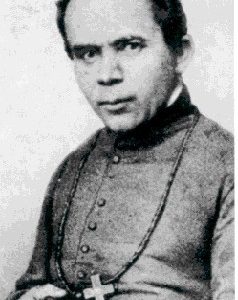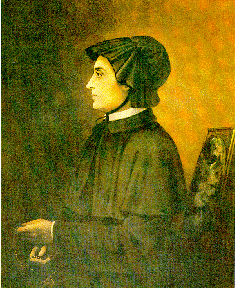Part 39 of This Present Paradise: Series of Reflections on St. Elizabeth of the Trinity
(Start with part 1 here.)
“Your little praise of glory cannot sleep, she is suffering; but in her soul, although the anguish penetrates there too, she feels so much peace, and it is your visit that has brought this heavenly peace. Her little heart needs to tell you this, and in her tender gratitude she is praying and suffering unceasingly for you! Oh, help me to climb my Calvary; I feel the power of your priesthood over my soul so strongly, and I need you so much,” wrote Elizabeth to her beloved prioress after a comforting visit in the infirmary. (L 320)
Mother Germaine was a gift straight from God to Elizabeth. She was one of those souls who come into our lives just when we need them, whose gifts seem tailor-made to our needs, who God directly uses to love and care for us.
She was a gift to the entire convent, and to the Church, as a natural maternal leader who was re-elected as prioress a total of eight times. She upheld unwaveringly the ideals of the Carmelite order, but had a tender heart and broke—or at least, relaxed—many of the rules regarding limited letter-writing and visits for Elizabeth and her friends and family. She sensitively realized the extraordinary distress of Elizabeth’s mother and hoped to relieve it. She intuitively understood that Elizabeth had a gift and a mission and needed to write more extensively to open the spiritual horizons of those in her life.
Mother Germaine helped Elizabeth to offer her entire life to the Lord—first, in her vows, and then, in her suffering and death. She clasped Elizabeth’s hands in her own and strengthened her in her most important and anguished moments.
In those final months, Elizabeth came to see her as exercising a sort of priestly ministry over her. (This is, of course, not in the ministerial sense, but in the context of the universal priesthood we were baptized into when we were conformed to Christ as priest, prophet, and king.) She was helping her to make an offering of herself to God in her final agony—gentle hands lifting the little ‘host’ up to her Trinity.
Elizabeth also came to see something else. She saw in her weary prioress a beloved daughter of the King, who, for all her devotion and holiness and service to Him, needed to hear and internalize a most fundamental message: You are loved.
And so, sometime in those last days, she secretly wrote a letter which she would tuck away for Mother Germaine to find after her death. The prioress would treasure the contents of that small white envelope for the rest of her life. In it, Elizabeth expressed the love of God in an outpouring of her heart, in desperate pain but desiring not to waste any opportunity to leave behind a word or expression of love.
Written as the fruit of deep prayer, Elizabeth composed it as a message that she believed came from God Himself, issued as a gentle command.
“My cherished Mother, my holy Priest, when you read these lines your little Praise of Glory will no longer be singing on earth, but will be living in Love’s immense furnace; so you can believe her and listen to her as ‘the voice’ of God. Cherished Mother, I would have liked to tell you all that you have been for me, but the hour is so serious, so solemn…and I don’t want to delay over telling you things that I think lose something when trying to explain them in words. What your child is coming to do is to reveal to you what she feels, or, to be more exact; what her God, in the hours of profound recollection, of unifying contact, makes her understand.
“‘You are uncommonly loved,’ loved by that love of preference that the Master had here below for some and which brought them so far. He does not say to you as to Peter: ‘Do you love Me more than these?” Mother, listen to what He tells you: ‘Let yourself be loved more than these! That is, without fearing that any obstacle will be a hinderance to it, for I am free to pour My love on whom I wish! ‘Let yourself be loved more than these’ is your vocation.”
What a testament to Elizabeth’s gift of empathy that while consumed with pain herself, she was still aware of Mother Germaine’s struggles: her worries, her burdens, her feelings of vulnerability and unworthiness and inadequacy. A young woman herself, she carried the weight of the world, or at least the entire convent, on her shoulders during a particularly difficult and uncertain time. Elizabeth knew that God wanted to have a special, unique, and unrepeatable relationship with this woman who had given up everything to be His.
“Let yourself be loved,” she repeated no less than six times in the letter. She focused more on being loved, on surrendering to the purifying, refining, tender, merciful, transforming love— than on loving. For all of Mother Germaine’s work and worry for the community, all He really wanted from her was her. Elizabeth more than anyone knew what waited for her spiritual mother in the prayer which was at the center of her call: a love unfathomable in its tenderness and mysterious mercy. A love that, once received, transforms us into who we are. She ached for those in her life—for everyone, in her ever-expanding heart—to know how sought after and how ‘exceedingly’ loved they are. Within that call to “let yourself be loved” is a message for all of us:
Let yourself be vulnerable. Let your walls down, your carefully constructed fortresses breached, your fiercely guarded heart laid bare. Let your wounds be touched, your fears revealed, your deepest desires, damaged dreams, and most daring hopes unveiled before the Bridegroom who has the power to redeem, restore, and resurrect them. Drop your independence and the idea—which you clutch so tightly—that you can do anything to protect and save yourself. And let Him love you.
Our universal vocation is to love. “Ask Him to make me live for love alone: this is my vocation…” Elizabeth wrote (L 172) but even more fundamentally, it is to be loved. Our primary vocation is to be loved by God. What a radically freeing idea. If we simply allow God to love us, then we have done the most important ‘work’ of our lives.
And we might not always feel loved, or worthy of being loved, (for all our desperate, clinging, grasping searching for it) but that is exactly where faith comes in. In Heaven in Faith, Elizabeth had pointed out to Guite that believing in God’s love for us is “our great act of faith, the way to repay our God love for love.” (HF, 20.) If we forget, one glance at a crucifix should serve to remind us.
Oh yes, we are greatly, infinitely, loved.
Image courtesy of Unsplash.
This article originally appeared on SpiritualDirection.com and is republished here with kind permission.












